Analyzing Legislation and Ethics in the Travel and Tourism Sector
VerifiedAdded on 2023/04/21
|13
|4391
|124
Report
AI Summary
This report provides a detailed analysis of the legal and regulatory framework governing the travel and tourism sector in the UK, including surface, air, and sea transport laws. It examines health and safety regulations, equality legislation, and consumer protection laws relevant to the industry. Furthermore, the report delves into ethical dilemmas faced by travel and tourism organizations and analyzes corporate social responsibility (CSR) policies, using Thomas Cook and Bell View Hotel as examples. The document emphasizes the importance of adhering to these regulations and ethical standards to ensure passenger safety, service quality, and fair treatment of employees and customers. Desklib offers a range of study tools, including similar reports and solved assignments for students.
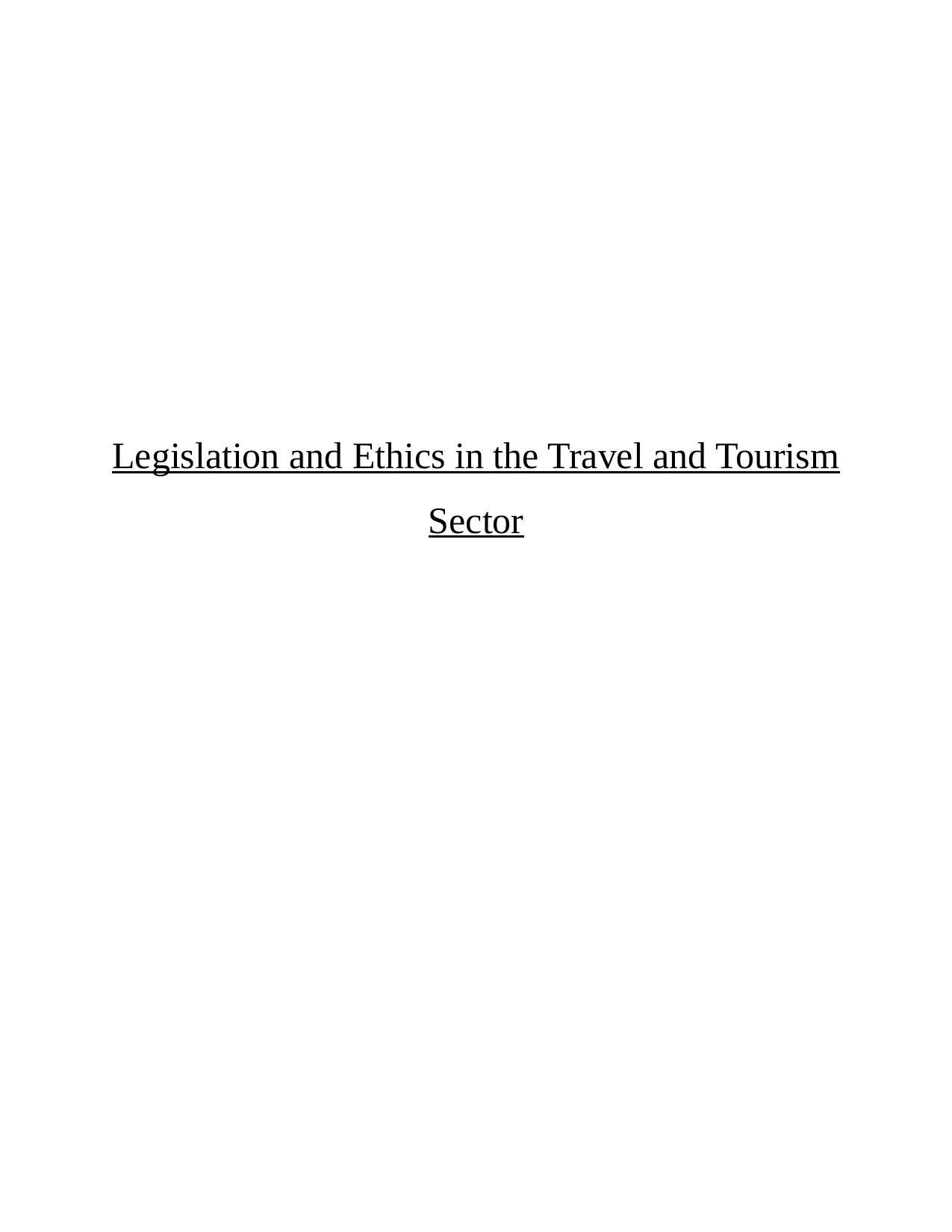
Legislation and Ethics in the Travel and Tourism
Sector
Sector
Paraphrase This Document
Need a fresh take? Get an instant paraphrase of this document with our AI Paraphraser
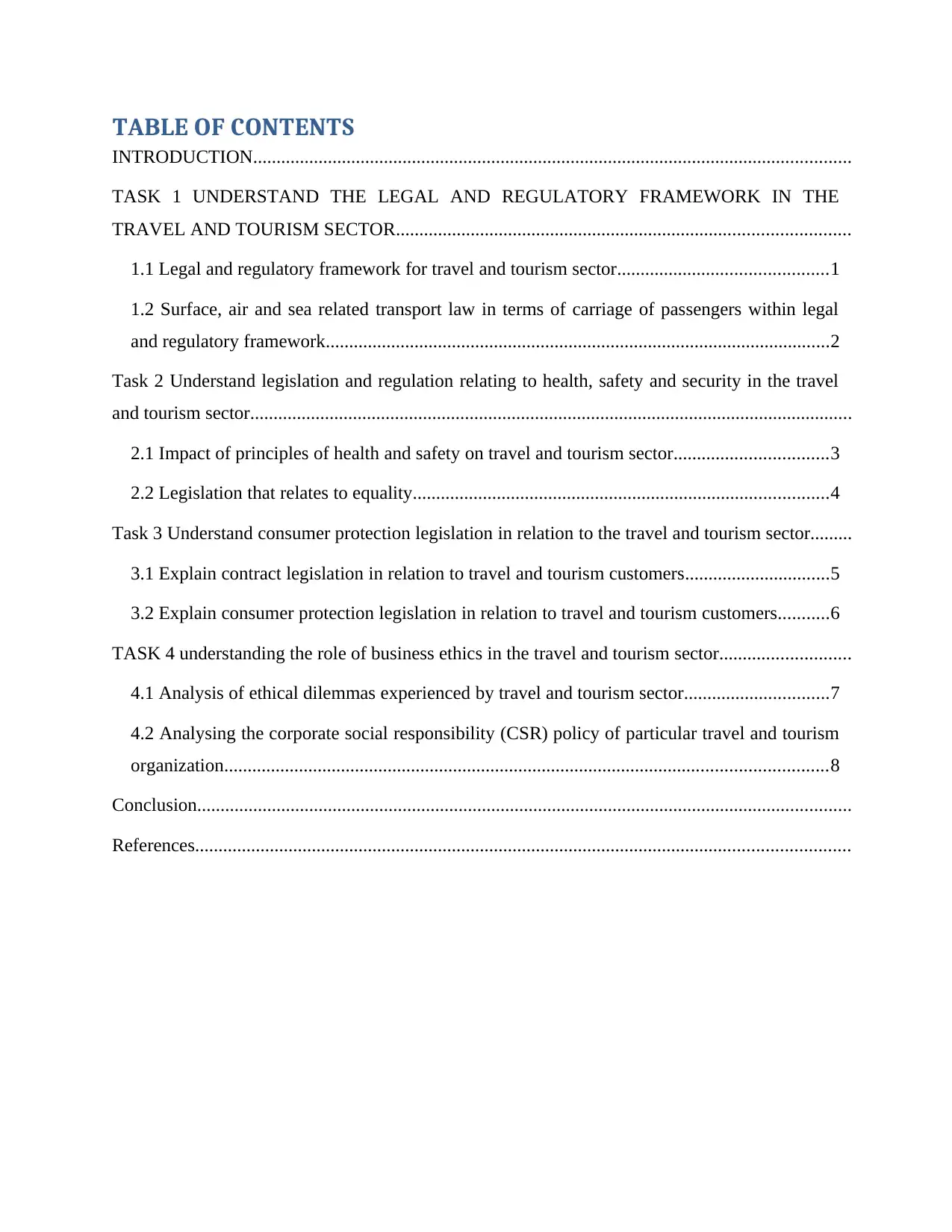
TABLE OF CONTENTS
INTRODUCTION................................................................................................................................
TASK 1 UNDERSTAND THE LEGAL AND REGULATORY FRAMEWORK IN THE
TRAVEL AND TOURISM SECTOR.................................................................................................
1.1 Legal and regulatory framework for travel and tourism sector.............................................1
1.2 Surface, air and sea related transport law in terms of carriage of passengers within legal
and regulatory framework............................................................................................................2
Task 2 Understand legislation and regulation relating to health, safety and security in the travel
and tourism sector.................................................................................................................................
2.1 Impact of principles of health and safety on travel and tourism sector.................................3
2.2 Legislation that relates to equality.........................................................................................4
Task 3 Understand consumer protection legislation in relation to the travel and tourism sector.........
3.1 Explain contract legislation in relation to travel and tourism customers...............................5
3.2 Explain consumer protection legislation in relation to travel and tourism customers...........6
TASK 4 understanding the role of business ethics in the travel and tourism sector............................
4.1 Analysis of ethical dilemmas experienced by travel and tourism sector...............................7
4.2 Analysing the corporate social responsibility (CSR) policy of particular travel and tourism
organization.................................................................................................................................8
Conclusion............................................................................................................................................
References............................................................................................................................................
INTRODUCTION................................................................................................................................
TASK 1 UNDERSTAND THE LEGAL AND REGULATORY FRAMEWORK IN THE
TRAVEL AND TOURISM SECTOR.................................................................................................
1.1 Legal and regulatory framework for travel and tourism sector.............................................1
1.2 Surface, air and sea related transport law in terms of carriage of passengers within legal
and regulatory framework............................................................................................................2
Task 2 Understand legislation and regulation relating to health, safety and security in the travel
and tourism sector.................................................................................................................................
2.1 Impact of principles of health and safety on travel and tourism sector.................................3
2.2 Legislation that relates to equality.........................................................................................4
Task 3 Understand consumer protection legislation in relation to the travel and tourism sector.........
3.1 Explain contract legislation in relation to travel and tourism customers...............................5
3.2 Explain consumer protection legislation in relation to travel and tourism customers...........6
TASK 4 understanding the role of business ethics in the travel and tourism sector............................
4.1 Analysis of ethical dilemmas experienced by travel and tourism sector...............................7
4.2 Analysing the corporate social responsibility (CSR) policy of particular travel and tourism
organization.................................................................................................................................8
Conclusion............................................................................................................................................
References............................................................................................................................................
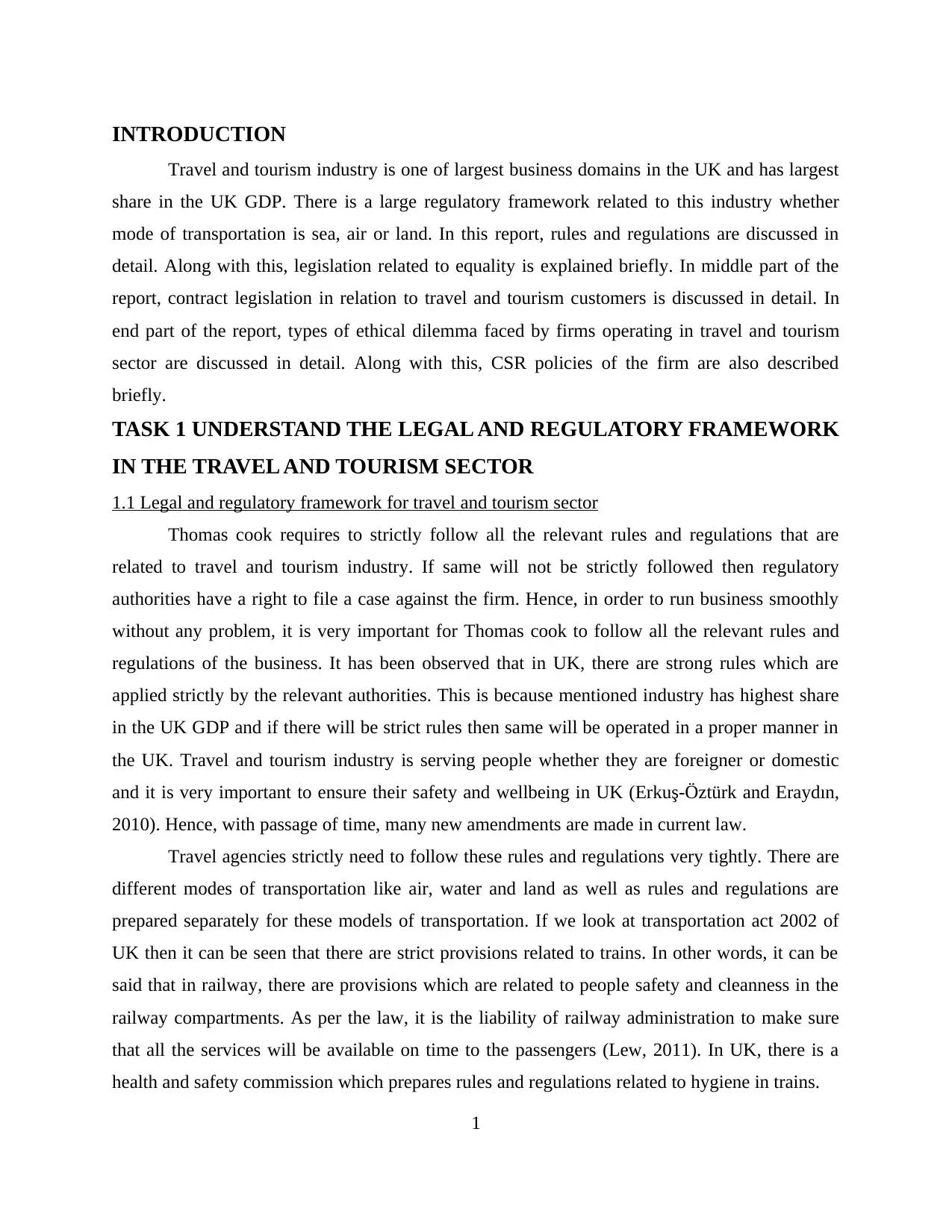
INTRODUCTION
Travel and tourism industry is one of largest business domains in the UK and has largest
share in the UK GDP. There is a large regulatory framework related to this industry whether
mode of transportation is sea, air or land. In this report, rules and regulations are discussed in
detail. Along with this, legislation related to equality is explained briefly. In middle part of the
report, contract legislation in relation to travel and tourism customers is discussed in detail. In
end part of the report, types of ethical dilemma faced by firms operating in travel and tourism
sector are discussed in detail. Along with this, CSR policies of the firm are also described
briefly.
TASK 1 UNDERSTAND THE LEGAL AND REGULATORY FRAMEWORK
IN THE TRAVEL AND TOURISM SECTOR
1.1 Legal and regulatory framework for travel and tourism sector
Thomas cook requires to strictly follow all the relevant rules and regulations that are
related to travel and tourism industry. If same will not be strictly followed then regulatory
authorities have a right to file a case against the firm. Hence, in order to run business smoothly
without any problem, it is very important for Thomas cook to follow all the relevant rules and
regulations of the business. It has been observed that in UK, there are strong rules which are
applied strictly by the relevant authorities. This is because mentioned industry has highest share
in the UK GDP and if there will be strict rules then same will be operated in a proper manner in
the UK. Travel and tourism industry is serving people whether they are foreigner or domestic
and it is very important to ensure their safety and wellbeing in UK (Erkuş-Öztürk and Eraydın,
2010). Hence, with passage of time, many new amendments are made in current law.
Travel agencies strictly need to follow these rules and regulations very tightly. There are
different modes of transportation like air, water and land as well as rules and regulations are
prepared separately for these models of transportation. If we look at transportation act 2002 of
UK then it can be seen that there are strict provisions related to trains. In other words, it can be
said that in railway, there are provisions which are related to people safety and cleanness in the
railway compartments. As per the law, it is the liability of railway administration to make sure
that all the services will be available on time to the passengers (Lew, 2011). In UK, there is a
health and safety commission which prepares rules and regulations related to hygiene in trains.
1
Travel and tourism industry is one of largest business domains in the UK and has largest
share in the UK GDP. There is a large regulatory framework related to this industry whether
mode of transportation is sea, air or land. In this report, rules and regulations are discussed in
detail. Along with this, legislation related to equality is explained briefly. In middle part of the
report, contract legislation in relation to travel and tourism customers is discussed in detail. In
end part of the report, types of ethical dilemma faced by firms operating in travel and tourism
sector are discussed in detail. Along with this, CSR policies of the firm are also described
briefly.
TASK 1 UNDERSTAND THE LEGAL AND REGULATORY FRAMEWORK
IN THE TRAVEL AND TOURISM SECTOR
1.1 Legal and regulatory framework for travel and tourism sector
Thomas cook requires to strictly follow all the relevant rules and regulations that are
related to travel and tourism industry. If same will not be strictly followed then regulatory
authorities have a right to file a case against the firm. Hence, in order to run business smoothly
without any problem, it is very important for Thomas cook to follow all the relevant rules and
regulations of the business. It has been observed that in UK, there are strong rules which are
applied strictly by the relevant authorities. This is because mentioned industry has highest share
in the UK GDP and if there will be strict rules then same will be operated in a proper manner in
the UK. Travel and tourism industry is serving people whether they are foreigner or domestic
and it is very important to ensure their safety and wellbeing in UK (Erkuş-Öztürk and Eraydın,
2010). Hence, with passage of time, many new amendments are made in current law.
Travel agencies strictly need to follow these rules and regulations very tightly. There are
different modes of transportation like air, water and land as well as rules and regulations are
prepared separately for these models of transportation. If we look at transportation act 2002 of
UK then it can be seen that there are strict provisions related to trains. In other words, it can be
said that in railway, there are provisions which are related to people safety and cleanness in the
railway compartments. As per the law, it is the liability of railway administration to make sure
that all the services will be available on time to the passengers (Lew, 2011). In UK, there is a
health and safety commission which prepares rules and regulations related to hygiene in trains.
1
⊘ This is a preview!⊘
Do you want full access?
Subscribe today to unlock all pages.

Trusted by 1+ million students worldwide
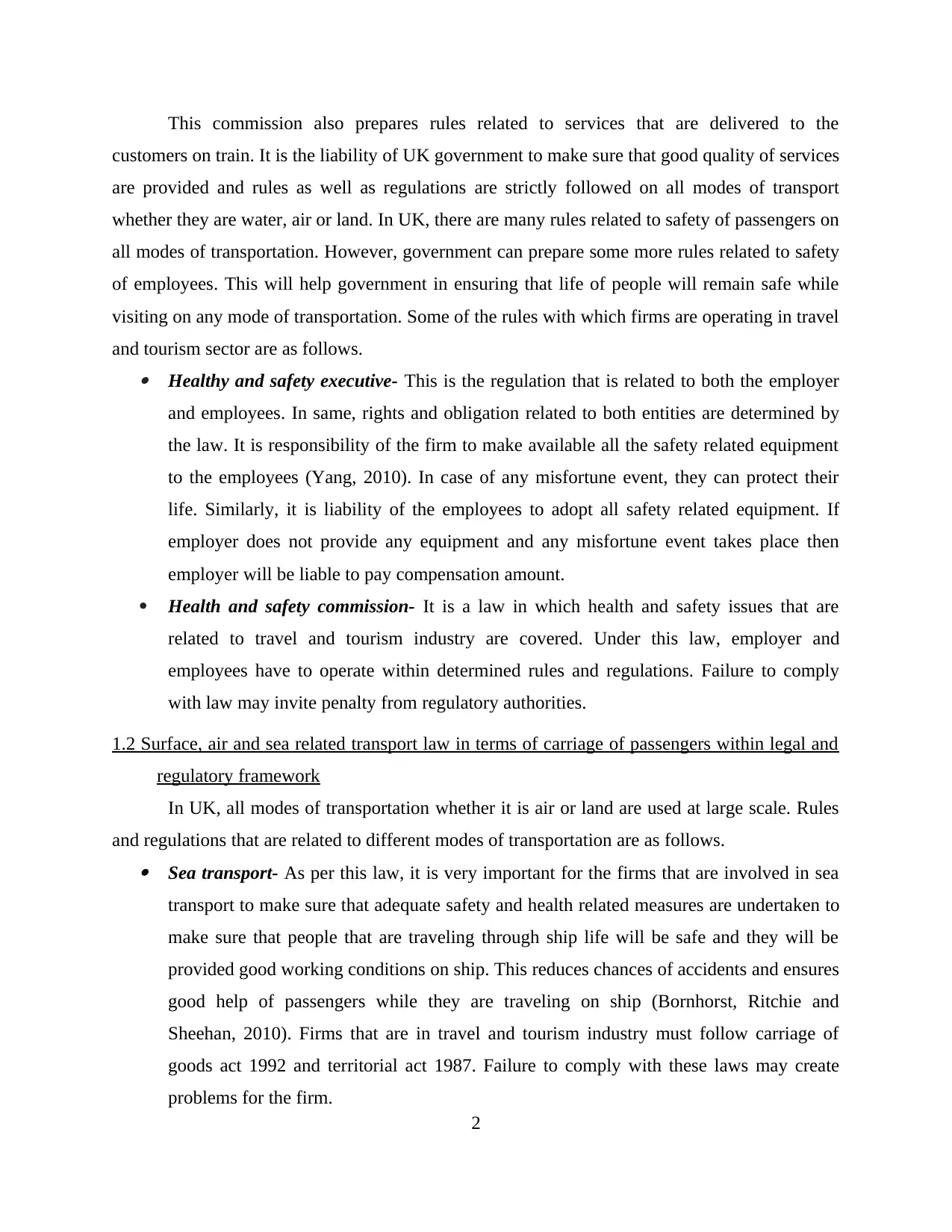
This commission also prepares rules related to services that are delivered to the
customers on train. It is the liability of UK government to make sure that good quality of services
are provided and rules as well as regulations are strictly followed on all modes of transport
whether they are water, air or land. In UK, there are many rules related to safety of passengers on
all modes of transportation. However, government can prepare some more rules related to safety
of employees. This will help government in ensuring that life of people will remain safe while
visiting on any mode of transportation. Some of the rules with which firms are operating in travel
and tourism sector are as follows. Healthy and safety executive- This is the regulation that is related to both the employer
and employees. In same, rights and obligation related to both entities are determined by
the law. It is responsibility of the firm to make available all the safety related equipment
to the employees (Yang, 2010). In case of any misfortune event, they can protect their
life. Similarly, it is liability of the employees to adopt all safety related equipment. If
employer does not provide any equipment and any misfortune event takes place then
employer will be liable to pay compensation amount.
Health and safety commission- It is a law in which health and safety issues that are
related to travel and tourism industry are covered. Under this law, employer and
employees have to operate within determined rules and regulations. Failure to comply
with law may invite penalty from regulatory authorities.
1.2 Surface, air and sea related transport law in terms of carriage of passengers within legal and
regulatory framework
In UK, all modes of transportation whether it is air or land are used at large scale. Rules
and regulations that are related to different modes of transportation are as follows. Sea transport- As per this law, it is very important for the firms that are involved in sea
transport to make sure that adequate safety and health related measures are undertaken to
make sure that people that are traveling through ship life will be safe and they will be
provided good working conditions on ship. This reduces chances of accidents and ensures
good help of passengers while they are traveling on ship (Bornhorst, Ritchie and
Sheehan, 2010). Firms that are in travel and tourism industry must follow carriage of
goods act 1992 and territorial act 1987. Failure to comply with these laws may create
problems for the firm.
2
customers on train. It is the liability of UK government to make sure that good quality of services
are provided and rules as well as regulations are strictly followed on all modes of transport
whether they are water, air or land. In UK, there are many rules related to safety of passengers on
all modes of transportation. However, government can prepare some more rules related to safety
of employees. This will help government in ensuring that life of people will remain safe while
visiting on any mode of transportation. Some of the rules with which firms are operating in travel
and tourism sector are as follows. Healthy and safety executive- This is the regulation that is related to both the employer
and employees. In same, rights and obligation related to both entities are determined by
the law. It is responsibility of the firm to make available all the safety related equipment
to the employees (Yang, 2010). In case of any misfortune event, they can protect their
life. Similarly, it is liability of the employees to adopt all safety related equipment. If
employer does not provide any equipment and any misfortune event takes place then
employer will be liable to pay compensation amount.
Health and safety commission- It is a law in which health and safety issues that are
related to travel and tourism industry are covered. Under this law, employer and
employees have to operate within determined rules and regulations. Failure to comply
with law may invite penalty from regulatory authorities.
1.2 Surface, air and sea related transport law in terms of carriage of passengers within legal and
regulatory framework
In UK, all modes of transportation whether it is air or land are used at large scale. Rules
and regulations that are related to different modes of transportation are as follows. Sea transport- As per this law, it is very important for the firms that are involved in sea
transport to make sure that adequate safety and health related measures are undertaken to
make sure that people that are traveling through ship life will be safe and they will be
provided good working conditions on ship. This reduces chances of accidents and ensures
good help of passengers while they are traveling on ship (Bornhorst, Ritchie and
Sheehan, 2010). Firms that are in travel and tourism industry must follow carriage of
goods act 1992 and territorial act 1987. Failure to comply with these laws may create
problems for the firm.
2
Paraphrase This Document
Need a fresh take? Get an instant paraphrase of this document with our AI Paraphraser
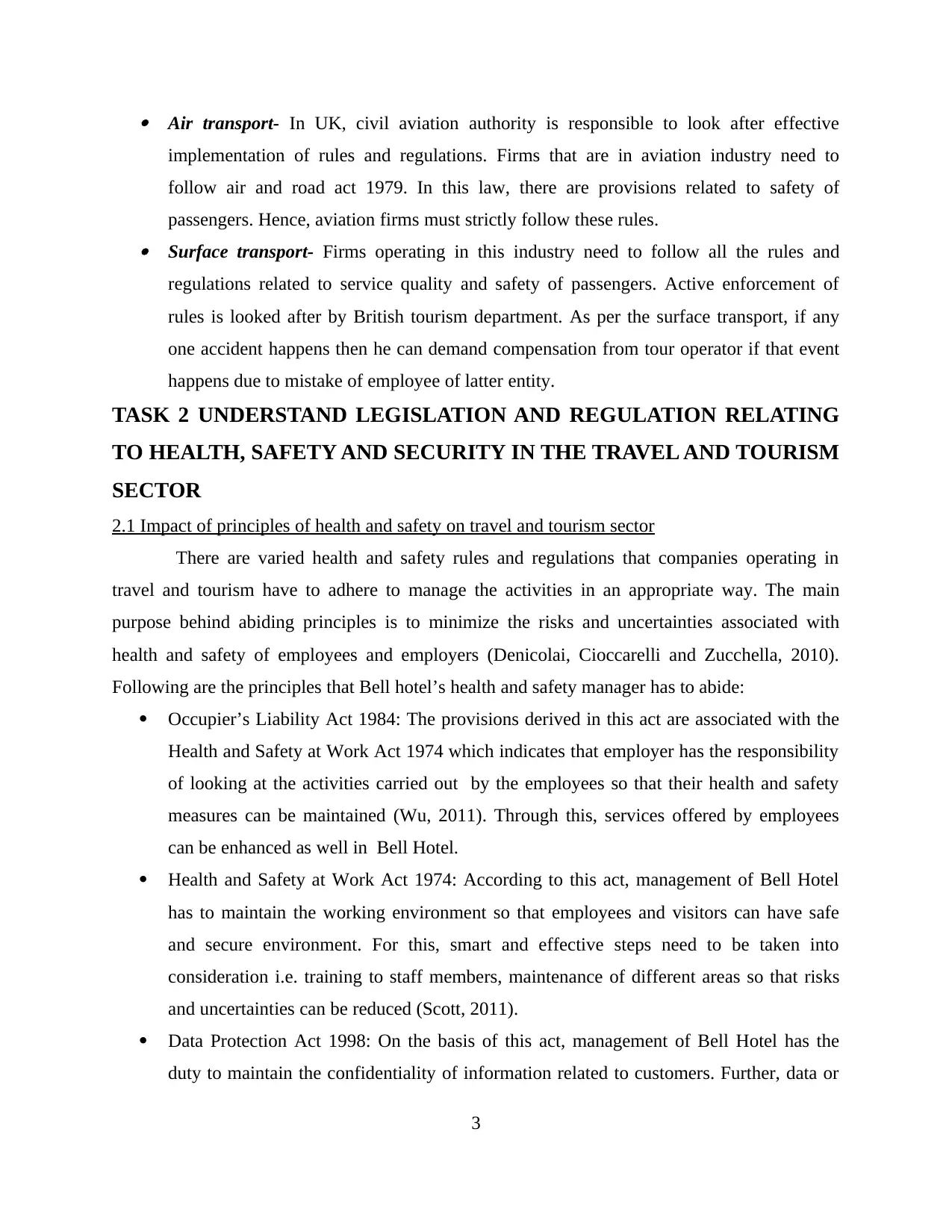
Air transport- In UK, civil aviation authority is responsible to look after effective
implementation of rules and regulations. Firms that are in aviation industry need to
follow air and road act 1979. In this law, there are provisions related to safety of
passengers. Hence, aviation firms must strictly follow these rules. Surface transport- Firms operating in this industry need to follow all the rules and
regulations related to service quality and safety of passengers. Active enforcement of
rules is looked after by British tourism department. As per the surface transport, if any
one accident happens then he can demand compensation from tour operator if that event
happens due to mistake of employee of latter entity.
TASK 2 UNDERSTAND LEGISLATION AND REGULATION RELATING
TO HEALTH, SAFETY AND SECURITY IN THE TRAVEL AND TOURISM
SECTOR
2.1 Impact of principles of health and safety on travel and tourism sector
There are varied health and safety rules and regulations that companies operating in
travel and tourism have to adhere to manage the activities in an appropriate way. The main
purpose behind abiding principles is to minimize the risks and uncertainties associated with
health and safety of employees and employers (Denicolai, Cioccarelli and Zucchella, 2010).
Following are the principles that Bell hotel’s health and safety manager has to abide:
Occupier’s Liability Act 1984: The provisions derived in this act are associated with the
Health and Safety at Work Act 1974 which indicates that employer has the responsibility
of looking at the activities carried out by the employees so that their health and safety
measures can be maintained (Wu, 2011). Through this, services offered by employees
can be enhanced as well in Bell Hotel.
Health and Safety at Work Act 1974: According to this act, management of Bell Hotel
has to maintain the working environment so that employees and visitors can have safe
and secure environment. For this, smart and effective steps need to be taken into
consideration i.e. training to staff members, maintenance of different areas so that risks
and uncertainties can be reduced (Scott, 2011).
Data Protection Act 1998: On the basis of this act, management of Bell Hotel has the
duty to maintain the confidentiality of information related to customers. Further, data or
3
implementation of rules and regulations. Firms that are in aviation industry need to
follow air and road act 1979. In this law, there are provisions related to safety of
passengers. Hence, aviation firms must strictly follow these rules. Surface transport- Firms operating in this industry need to follow all the rules and
regulations related to service quality and safety of passengers. Active enforcement of
rules is looked after by British tourism department. As per the surface transport, if any
one accident happens then he can demand compensation from tour operator if that event
happens due to mistake of employee of latter entity.
TASK 2 UNDERSTAND LEGISLATION AND REGULATION RELATING
TO HEALTH, SAFETY AND SECURITY IN THE TRAVEL AND TOURISM
SECTOR
2.1 Impact of principles of health and safety on travel and tourism sector
There are varied health and safety rules and regulations that companies operating in
travel and tourism have to adhere to manage the activities in an appropriate way. The main
purpose behind abiding principles is to minimize the risks and uncertainties associated with
health and safety of employees and employers (Denicolai, Cioccarelli and Zucchella, 2010).
Following are the principles that Bell hotel’s health and safety manager has to abide:
Occupier’s Liability Act 1984: The provisions derived in this act are associated with the
Health and Safety at Work Act 1974 which indicates that employer has the responsibility
of looking at the activities carried out by the employees so that their health and safety
measures can be maintained (Wu, 2011). Through this, services offered by employees
can be enhanced as well in Bell Hotel.
Health and Safety at Work Act 1974: According to this act, management of Bell Hotel
has to maintain the working environment so that employees and visitors can have safe
and secure environment. For this, smart and effective steps need to be taken into
consideration i.e. training to staff members, maintenance of different areas so that risks
and uncertainties can be reduced (Scott, 2011).
Data Protection Act 1998: On the basis of this act, management of Bell Hotel has the
duty to maintain the confidentiality of information related to customers. Further, data or
3
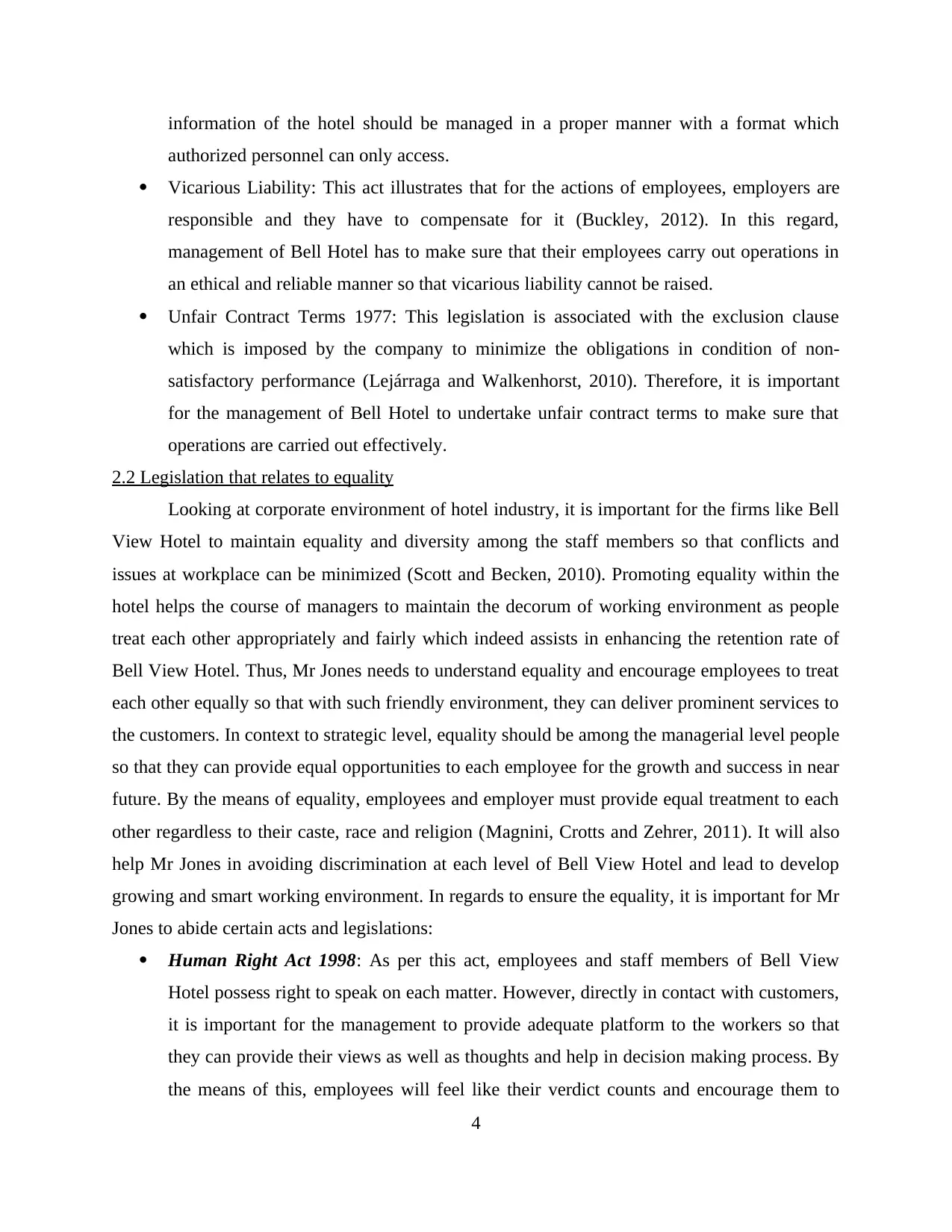
information of the hotel should be managed in a proper manner with a format which
authorized personnel can only access.
Vicarious Liability: This act illustrates that for the actions of employees, employers are
responsible and they have to compensate for it (Buckley, 2012). In this regard,
management of Bell Hotel has to make sure that their employees carry out operations in
an ethical and reliable manner so that vicarious liability cannot be raised.
Unfair Contract Terms 1977: This legislation is associated with the exclusion clause
which is imposed by the company to minimize the obligations in condition of non-
satisfactory performance (Lejárraga and Walkenhorst, 2010). Therefore, it is important
for the management of Bell Hotel to undertake unfair contract terms to make sure that
operations are carried out effectively.
2.2 Legislation that relates to equality
Looking at corporate environment of hotel industry, it is important for the firms like Bell
View Hotel to maintain equality and diversity among the staff members so that conflicts and
issues at workplace can be minimized (Scott and Becken, 2010). Promoting equality within the
hotel helps the course of managers to maintain the decorum of working environment as people
treat each other appropriately and fairly which indeed assists in enhancing the retention rate of
Bell View Hotel. Thus, Mr Jones needs to understand equality and encourage employees to treat
each other equally so that with such friendly environment, they can deliver prominent services to
the customers. In context to strategic level, equality should be among the managerial level people
so that they can provide equal opportunities to each employee for the growth and success in near
future. By the means of equality, employees and employer must provide equal treatment to each
other regardless to their caste, race and religion (Magnini, Crotts and Zehrer, 2011). It will also
help Mr Jones in avoiding discrimination at each level of Bell View Hotel and lead to develop
growing and smart working environment. In regards to ensure the equality, it is important for Mr
Jones to abide certain acts and legislations:
Human Right Act 1998: As per this act, employees and staff members of Bell View
Hotel possess right to speak on each matter. However, directly in contact with customers,
it is important for the management to provide adequate platform to the workers so that
they can provide their views as well as thoughts and help in decision making process. By
the means of this, employees will feel like their verdict counts and encourage them to
4
authorized personnel can only access.
Vicarious Liability: This act illustrates that for the actions of employees, employers are
responsible and they have to compensate for it (Buckley, 2012). In this regard,
management of Bell Hotel has to make sure that their employees carry out operations in
an ethical and reliable manner so that vicarious liability cannot be raised.
Unfair Contract Terms 1977: This legislation is associated with the exclusion clause
which is imposed by the company to minimize the obligations in condition of non-
satisfactory performance (Lejárraga and Walkenhorst, 2010). Therefore, it is important
for the management of Bell Hotel to undertake unfair contract terms to make sure that
operations are carried out effectively.
2.2 Legislation that relates to equality
Looking at corporate environment of hotel industry, it is important for the firms like Bell
View Hotel to maintain equality and diversity among the staff members so that conflicts and
issues at workplace can be minimized (Scott and Becken, 2010). Promoting equality within the
hotel helps the course of managers to maintain the decorum of working environment as people
treat each other appropriately and fairly which indeed assists in enhancing the retention rate of
Bell View Hotel. Thus, Mr Jones needs to understand equality and encourage employees to treat
each other equally so that with such friendly environment, they can deliver prominent services to
the customers. In context to strategic level, equality should be among the managerial level people
so that they can provide equal opportunities to each employee for the growth and success in near
future. By the means of equality, employees and employer must provide equal treatment to each
other regardless to their caste, race and religion (Magnini, Crotts and Zehrer, 2011). It will also
help Mr Jones in avoiding discrimination at each level of Bell View Hotel and lead to develop
growing and smart working environment. In regards to ensure the equality, it is important for Mr
Jones to abide certain acts and legislations:
Human Right Act 1998: As per this act, employees and staff members of Bell View
Hotel possess right to speak on each matter. However, directly in contact with customers,
it is important for the management to provide adequate platform to the workers so that
they can provide their views as well as thoughts and help in decision making process. By
the means of this, employees will feel like their verdict counts and encourage them to
4
⊘ This is a preview!⊘
Do you want full access?
Subscribe today to unlock all pages.

Trusted by 1+ million students worldwide
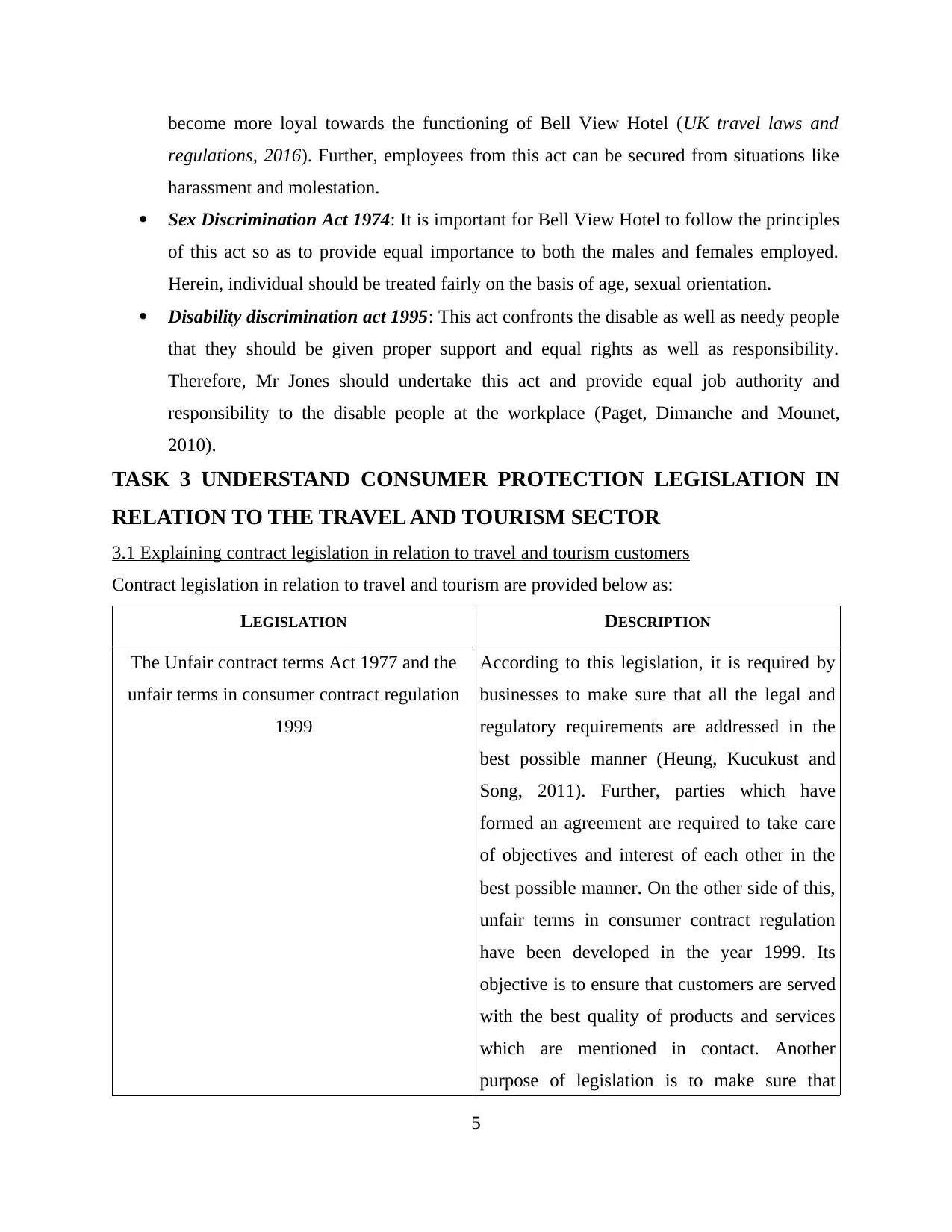
become more loyal towards the functioning of Bell View Hotel (UK travel laws and
regulations, 2016). Further, employees from this act can be secured from situations like
harassment and molestation.
Sex Discrimination Act 1974: It is important for Bell View Hotel to follow the principles
of this act so as to provide equal importance to both the males and females employed.
Herein, individual should be treated fairly on the basis of age, sexual orientation.
Disability discrimination act 1995: This act confronts the disable as well as needy people
that they should be given proper support and equal rights as well as responsibility.
Therefore, Mr Jones should undertake this act and provide equal job authority and
responsibility to the disable people at the workplace (Paget, Dimanche and Mounet,
2010).
TASK 3 UNDERSTAND CONSUMER PROTECTION LEGISLATION IN
RELATION TO THE TRAVEL AND TOURISM SECTOR
3.1 Explaining contract legislation in relation to travel and tourism customers
Contract legislation in relation to travel and tourism are provided below as:
LEGISLATION DESCRIPTION
The Unfair contract terms Act 1977 and the
unfair terms in consumer contract regulation
1999
According to this legislation, it is required by
businesses to make sure that all the legal and
regulatory requirements are addressed in the
best possible manner (Heung, Kucukust and
Song, 2011). Further, parties which have
formed an agreement are required to take care
of objectives and interest of each other in the
best possible manner. On the other side of this,
unfair terms in consumer contract regulation
have been developed in the year 1999. Its
objective is to ensure that customers are served
with the best quality of products and services
which are mentioned in contact. Another
purpose of legislation is to make sure that
5
regulations, 2016). Further, employees from this act can be secured from situations like
harassment and molestation.
Sex Discrimination Act 1974: It is important for Bell View Hotel to follow the principles
of this act so as to provide equal importance to both the males and females employed.
Herein, individual should be treated fairly on the basis of age, sexual orientation.
Disability discrimination act 1995: This act confronts the disable as well as needy people
that they should be given proper support and equal rights as well as responsibility.
Therefore, Mr Jones should undertake this act and provide equal job authority and
responsibility to the disable people at the workplace (Paget, Dimanche and Mounet,
2010).
TASK 3 UNDERSTAND CONSUMER PROTECTION LEGISLATION IN
RELATION TO THE TRAVEL AND TOURISM SECTOR
3.1 Explaining contract legislation in relation to travel and tourism customers
Contract legislation in relation to travel and tourism are provided below as:
LEGISLATION DESCRIPTION
The Unfair contract terms Act 1977 and the
unfair terms in consumer contract regulation
1999
According to this legislation, it is required by
businesses to make sure that all the legal and
regulatory requirements are addressed in the
best possible manner (Heung, Kucukust and
Song, 2011). Further, parties which have
formed an agreement are required to take care
of objectives and interest of each other in the
best possible manner. On the other side of this,
unfair terms in consumer contract regulation
have been developed in the year 1999. Its
objective is to ensure that customers are served
with the best quality of products and services
which are mentioned in contact. Another
purpose of legislation is to make sure that
5
Paraphrase This Document
Need a fresh take? Get an instant paraphrase of this document with our AI Paraphraser
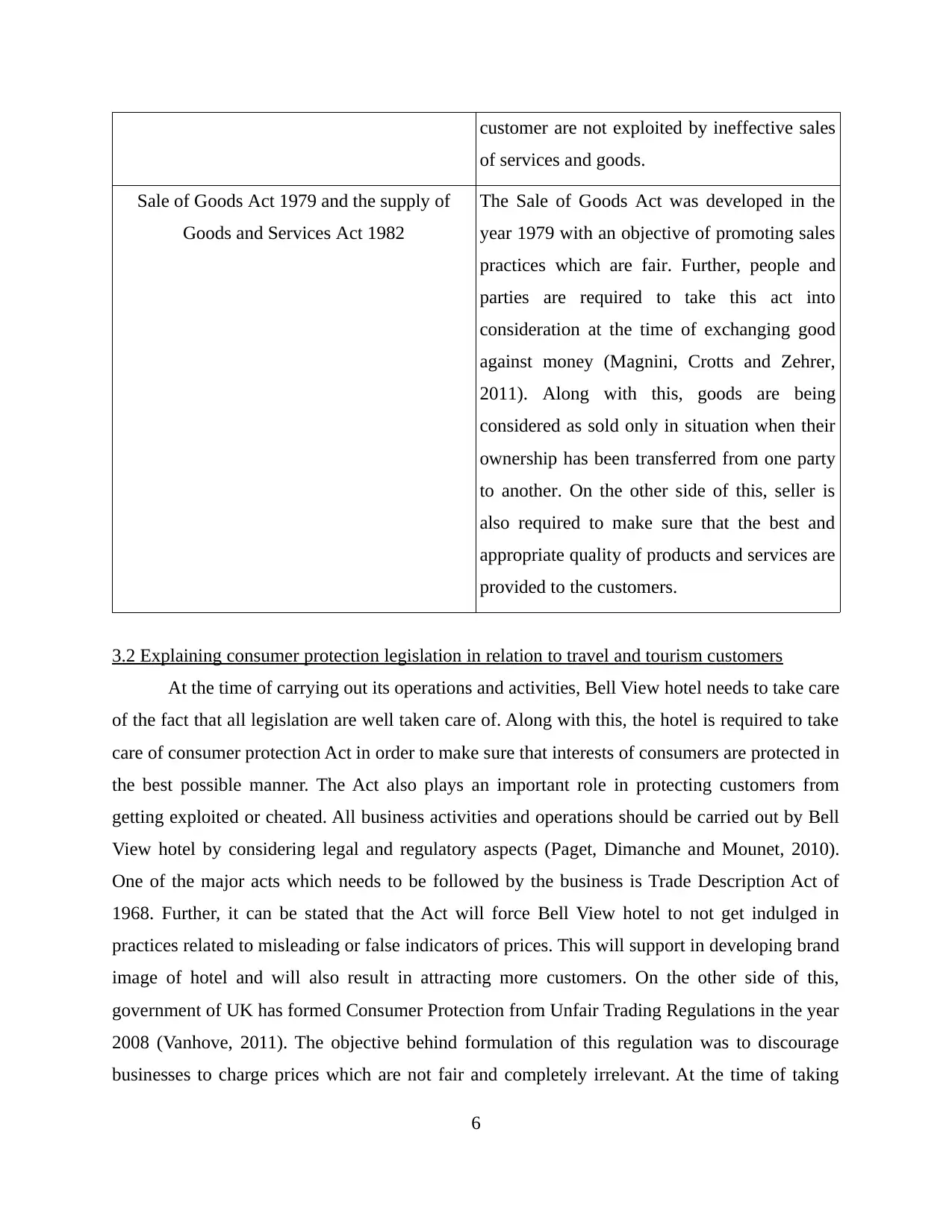
customer are not exploited by ineffective sales
of services and goods.
Sale of Goods Act 1979 and the supply of
Goods and Services Act 1982
The Sale of Goods Act was developed in the
year 1979 with an objective of promoting sales
practices which are fair. Further, people and
parties are required to take this act into
consideration at the time of exchanging good
against money (Magnini, Crotts and Zehrer,
2011). Along with this, goods are being
considered as sold only in situation when their
ownership has been transferred from one party
to another. On the other side of this, seller is
also required to make sure that the best and
appropriate quality of products and services are
provided to the customers.
3.2 Explaining consumer protection legislation in relation to travel and tourism customers
At the time of carrying out its operations and activities, Bell View hotel needs to take care
of the fact that all legislation are well taken care of. Along with this, the hotel is required to take
care of consumer protection Act in order to make sure that interests of consumers are protected in
the best possible manner. The Act also plays an important role in protecting customers from
getting exploited or cheated. All business activities and operations should be carried out by Bell
View hotel by considering legal and regulatory aspects (Paget, Dimanche and Mounet, 2010).
One of the major acts which needs to be followed by the business is Trade Description Act of
1968. Further, it can be stated that the Act will force Bell View hotel to not get indulged in
practices related to misleading or false indicators of prices. This will support in developing brand
image of hotel and will also result in attracting more customers. On the other side of this,
government of UK has formed Consumer Protection from Unfair Trading Regulations in the year
2008 (Vanhove, 2011). The objective behind formulation of this regulation was to discourage
businesses to charge prices which are not fair and completely irrelevant. At the time of taking
6
of services and goods.
Sale of Goods Act 1979 and the supply of
Goods and Services Act 1982
The Sale of Goods Act was developed in the
year 1979 with an objective of promoting sales
practices which are fair. Further, people and
parties are required to take this act into
consideration at the time of exchanging good
against money (Magnini, Crotts and Zehrer,
2011). Along with this, goods are being
considered as sold only in situation when their
ownership has been transferred from one party
to another. On the other side of this, seller is
also required to make sure that the best and
appropriate quality of products and services are
provided to the customers.
3.2 Explaining consumer protection legislation in relation to travel and tourism customers
At the time of carrying out its operations and activities, Bell View hotel needs to take care
of the fact that all legislation are well taken care of. Along with this, the hotel is required to take
care of consumer protection Act in order to make sure that interests of consumers are protected in
the best possible manner. The Act also plays an important role in protecting customers from
getting exploited or cheated. All business activities and operations should be carried out by Bell
View hotel by considering legal and regulatory aspects (Paget, Dimanche and Mounet, 2010).
One of the major acts which needs to be followed by the business is Trade Description Act of
1968. Further, it can be stated that the Act will force Bell View hotel to not get indulged in
practices related to misleading or false indicators of prices. This will support in developing brand
image of hotel and will also result in attracting more customers. On the other side of this,
government of UK has formed Consumer Protection from Unfair Trading Regulations in the year
2008 (Vanhove, 2011). The objective behind formulation of this regulation was to discourage
businesses to charge prices which are not fair and completely irrelevant. At the time of taking
6
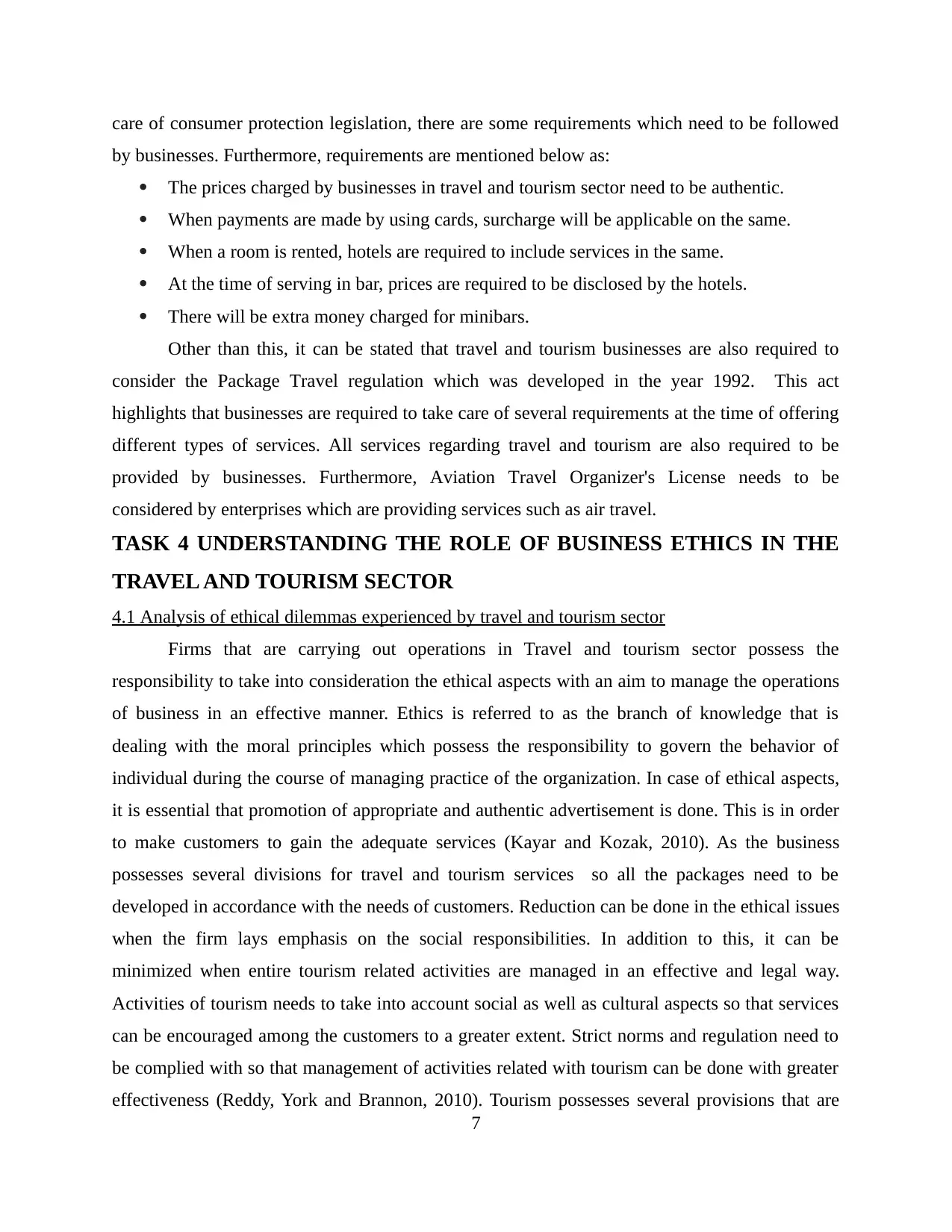
care of consumer protection legislation, there are some requirements which need to be followed
by businesses. Furthermore, requirements are mentioned below as:
The prices charged by businesses in travel and tourism sector need to be authentic.
When payments are made by using cards, surcharge will be applicable on the same.
When a room is rented, hotels are required to include services in the same.
At the time of serving in bar, prices are required to be disclosed by the hotels.
There will be extra money charged for minibars.
Other than this, it can be stated that travel and tourism businesses are also required to
consider the Package Travel regulation which was developed in the year 1992. This act
highlights that businesses are required to take care of several requirements at the time of offering
different types of services. All services regarding travel and tourism are also required to be
provided by businesses. Furthermore, Aviation Travel Organizer's License needs to be
considered by enterprises which are providing services such as air travel.
TASK 4 UNDERSTANDING THE ROLE OF BUSINESS ETHICS IN THE
TRAVEL AND TOURISM SECTOR
4.1 Analysis of ethical dilemmas experienced by travel and tourism sector
Firms that are carrying out operations in Travel and tourism sector possess the
responsibility to take into consideration the ethical aspects with an aim to manage the operations
of business in an effective manner. Ethics is referred to as the branch of knowledge that is
dealing with the moral principles which possess the responsibility to govern the behavior of
individual during the course of managing practice of the organization. In case of ethical aspects,
it is essential that promotion of appropriate and authentic advertisement is done. This is in order
to make customers to gain the adequate services (Kayar and Kozak, 2010). As the business
possesses several divisions for travel and tourism services so all the packages need to be
developed in accordance with the needs of customers. Reduction can be done in the ethical issues
when the firm lays emphasis on the social responsibilities. In addition to this, it can be
minimized when entire tourism related activities are managed in an effective and legal way.
Activities of tourism needs to take into account social as well as cultural aspects so that services
can be encouraged among the customers to a greater extent. Strict norms and regulation need to
be complied with so that management of activities related with tourism can be done with greater
effectiveness (Reddy, York and Brannon, 2010). Tourism possesses several provisions that are
7
by businesses. Furthermore, requirements are mentioned below as:
The prices charged by businesses in travel and tourism sector need to be authentic.
When payments are made by using cards, surcharge will be applicable on the same.
When a room is rented, hotels are required to include services in the same.
At the time of serving in bar, prices are required to be disclosed by the hotels.
There will be extra money charged for minibars.
Other than this, it can be stated that travel and tourism businesses are also required to
consider the Package Travel regulation which was developed in the year 1992. This act
highlights that businesses are required to take care of several requirements at the time of offering
different types of services. All services regarding travel and tourism are also required to be
provided by businesses. Furthermore, Aviation Travel Organizer's License needs to be
considered by enterprises which are providing services such as air travel.
TASK 4 UNDERSTANDING THE ROLE OF BUSINESS ETHICS IN THE
TRAVEL AND TOURISM SECTOR
4.1 Analysis of ethical dilemmas experienced by travel and tourism sector
Firms that are carrying out operations in Travel and tourism sector possess the
responsibility to take into consideration the ethical aspects with an aim to manage the operations
of business in an effective manner. Ethics is referred to as the branch of knowledge that is
dealing with the moral principles which possess the responsibility to govern the behavior of
individual during the course of managing practice of the organization. In case of ethical aspects,
it is essential that promotion of appropriate and authentic advertisement is done. This is in order
to make customers to gain the adequate services (Kayar and Kozak, 2010). As the business
possesses several divisions for travel and tourism services so all the packages need to be
developed in accordance with the needs of customers. Reduction can be done in the ethical issues
when the firm lays emphasis on the social responsibilities. In addition to this, it can be
minimized when entire tourism related activities are managed in an effective and legal way.
Activities of tourism needs to take into account social as well as cultural aspects so that services
can be encouraged among the customers to a greater extent. Strict norms and regulation need to
be complied with so that management of activities related with tourism can be done with greater
effectiveness (Reddy, York and Brannon, 2010). Tourism possesses several provisions that are
7
⊘ This is a preview!⊘
Do you want full access?
Subscribe today to unlock all pages.

Trusted by 1+ million students worldwide

related with the activities of corruption. Thus, it is essential for the concerned business to ensure
that personnel as well as associated parties are keeping management of their roles as well as
responsibilities in an appropriate manner. The issues that relate with funding can also be
resolved. Thus, the firm is required to adopt legal as well as authentic ways while making
delivery of services.
4.2 Analysing the corporate social responsibility (CSR) policy of particular travel and tourism
organization
Under the aspect that relates with the ethical behavior, the role of corporate social
responsibility is very critical. Thus, businesses that are carrying out operations in Travel and
tourism sector need to devise strategies of CSR. These strategies work on behalf of the firm with
an aim to payback their shares to the society. Various activities are involved under this that
include protection of environment, equal opportunity as well as practice of sustainable
development (Mishra, Rout and Mohapatra, 2011). Travel and tourism sector needs to carry out
corporate social responsibility wherein requirements of the local people need to be fulfilled in an
effective manner. CSR strategies need to take into account social, cultural as well as
environmental aspects in order to conserve and prevent the biodiversity and cultural heritage. It
is important for the tourism business to carry out its corporate social responsibility as it is the
essential part of tourism (Lin, 2010). Various things are required to be taken into account under
such aspect. These have been enumerated in the manner stated as under: Environment: The main motive of firm needs to be for the purpose of managing all the
functions in accordance with the environmental aspects. Thus, all the activities need to be
carried out accordingly (Martin-Cejas and Sánchez, 2010). Every organization needs to
devise various strategies for preservation of the environmental resources. Internal business activities: It is important for the corporation to make management of all
the personnel in an appropriate way in order to assist the firm in raising the level of
service standards. Moreover, employees require to carry out all the practices in an
ethical manner so that they can make contribution towards the economy (Magnini, Crotts
and Zehrer, 2011).
Philanthropy: Travel and tourism business needs to give funds to other business for the
purpose of charity as well as social welfare. This is in order to make promotion of the
business services to a greater extent. Each year such type of activity needs to be carried
8
that personnel as well as associated parties are keeping management of their roles as well as
responsibilities in an appropriate manner. The issues that relate with funding can also be
resolved. Thus, the firm is required to adopt legal as well as authentic ways while making
delivery of services.
4.2 Analysing the corporate social responsibility (CSR) policy of particular travel and tourism
organization
Under the aspect that relates with the ethical behavior, the role of corporate social
responsibility is very critical. Thus, businesses that are carrying out operations in Travel and
tourism sector need to devise strategies of CSR. These strategies work on behalf of the firm with
an aim to payback their shares to the society. Various activities are involved under this that
include protection of environment, equal opportunity as well as practice of sustainable
development (Mishra, Rout and Mohapatra, 2011). Travel and tourism sector needs to carry out
corporate social responsibility wherein requirements of the local people need to be fulfilled in an
effective manner. CSR strategies need to take into account social, cultural as well as
environmental aspects in order to conserve and prevent the biodiversity and cultural heritage. It
is important for the tourism business to carry out its corporate social responsibility as it is the
essential part of tourism (Lin, 2010). Various things are required to be taken into account under
such aspect. These have been enumerated in the manner stated as under: Environment: The main motive of firm needs to be for the purpose of managing all the
functions in accordance with the environmental aspects. Thus, all the activities need to be
carried out accordingly (Martin-Cejas and Sánchez, 2010). Every organization needs to
devise various strategies for preservation of the environmental resources. Internal business activities: It is important for the corporation to make management of all
the personnel in an appropriate way in order to assist the firm in raising the level of
service standards. Moreover, employees require to carry out all the practices in an
ethical manner so that they can make contribution towards the economy (Magnini, Crotts
and Zehrer, 2011).
Philanthropy: Travel and tourism business needs to give funds to other business for the
purpose of charity as well as social welfare. This is in order to make promotion of the
business services to a greater extent. Each year such type of activity needs to be carried
8
Paraphrase This Document
Need a fresh take? Get an instant paraphrase of this document with our AI Paraphraser
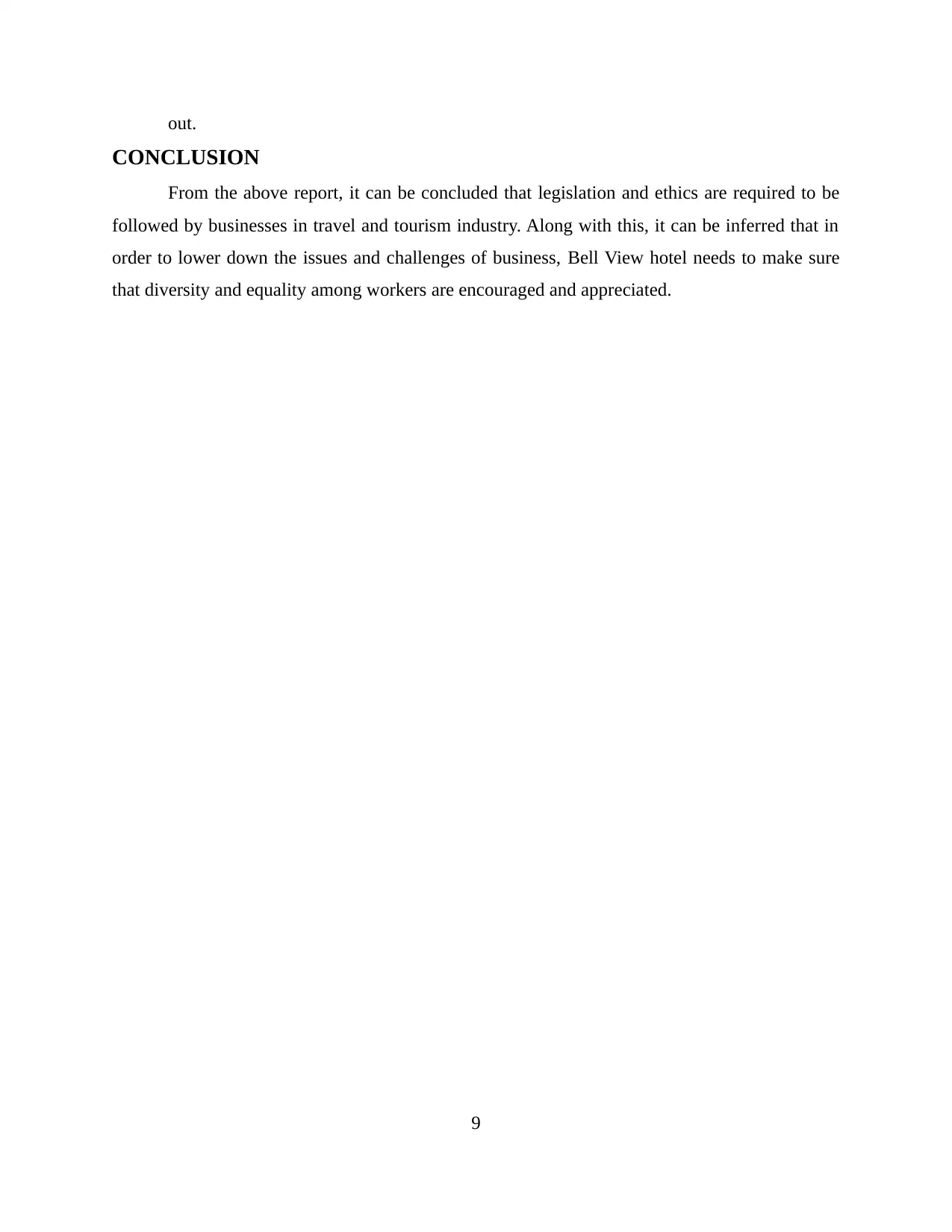
out.
CONCLUSION
From the above report, it can be concluded that legislation and ethics are required to be
followed by businesses in travel and tourism industry. Along with this, it can be inferred that in
order to lower down the issues and challenges of business, Bell View hotel needs to make sure
that diversity and equality among workers are encouraged and appreciated.
9
CONCLUSION
From the above report, it can be concluded that legislation and ethics are required to be
followed by businesses in travel and tourism industry. Along with this, it can be inferred that in
order to lower down the issues and challenges of business, Bell View hotel needs to make sure
that diversity and equality among workers are encouraged and appreciated.
9
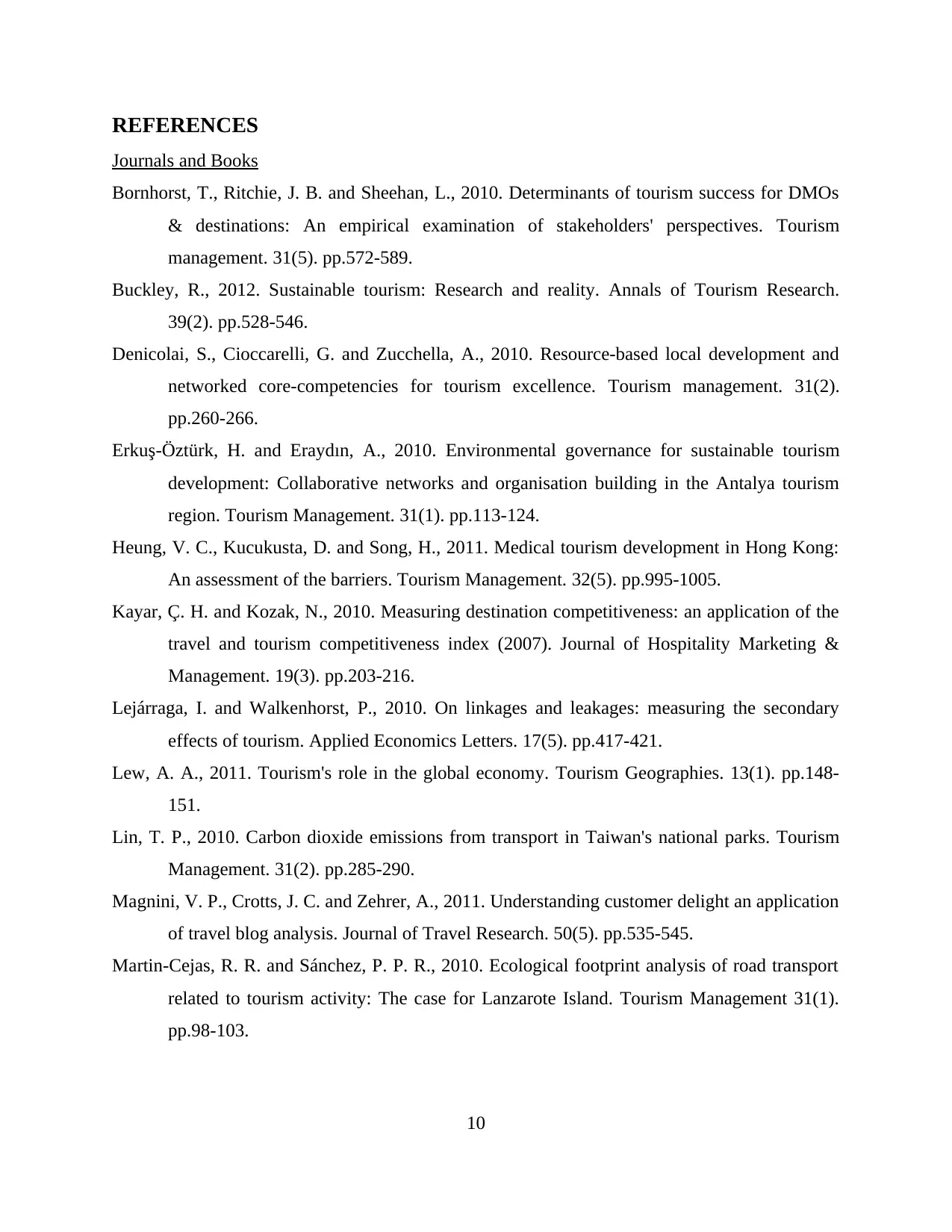
REFERENCES
Journals and Books
Bornhorst, T., Ritchie, J. B. and Sheehan, L., 2010. Determinants of tourism success for DMOs
& destinations: An empirical examination of stakeholders' perspectives. Tourism
management. 31(5). pp.572-589.
Buckley, R., 2012. Sustainable tourism: Research and reality. Annals of Tourism Research.
39(2). pp.528-546.
Denicolai, S., Cioccarelli, G. and Zucchella, A., 2010. Resource-based local development and
networked core-competencies for tourism excellence. Tourism management. 31(2).
pp.260-266.
Erkuş-Öztürk, H. and Eraydın, A., 2010. Environmental governance for sustainable tourism
development: Collaborative networks and organisation building in the Antalya tourism
region. Tourism Management. 31(1). pp.113-124.
Heung, V. C., Kucukusta, D. and Song, H., 2011. Medical tourism development in Hong Kong:
An assessment of the barriers. Tourism Management. 32(5). pp.995-1005.
Kayar, Ç. H. and Kozak, N., 2010. Measuring destination competitiveness: an application of the
travel and tourism competitiveness index (2007). Journal of Hospitality Marketing &
Management. 19(3). pp.203-216.
Lejárraga, I. and Walkenhorst, P., 2010. On linkages and leakages: measuring the secondary
effects of tourism. Applied Economics Letters. 17(5). pp.417-421.
Lew, A. A., 2011. Tourism's role in the global economy. Tourism Geographies. 13(1). pp.148-
151.
Lin, T. P., 2010. Carbon dioxide emissions from transport in Taiwan's national parks. Tourism
Management. 31(2). pp.285-290.
Magnini, V. P., Crotts, J. C. and Zehrer, A., 2011. Understanding customer delight an application
of travel blog analysis. Journal of Travel Research. 50(5). pp.535-545.
Martin-Cejas, R. R. and Sánchez, P. P. R., 2010. Ecological footprint analysis of road transport
related to tourism activity: The case for Lanzarote Island. Tourism Management 31(1).
pp.98-103.
10
Journals and Books
Bornhorst, T., Ritchie, J. B. and Sheehan, L., 2010. Determinants of tourism success for DMOs
& destinations: An empirical examination of stakeholders' perspectives. Tourism
management. 31(5). pp.572-589.
Buckley, R., 2012. Sustainable tourism: Research and reality. Annals of Tourism Research.
39(2). pp.528-546.
Denicolai, S., Cioccarelli, G. and Zucchella, A., 2010. Resource-based local development and
networked core-competencies for tourism excellence. Tourism management. 31(2).
pp.260-266.
Erkuş-Öztürk, H. and Eraydın, A., 2010. Environmental governance for sustainable tourism
development: Collaborative networks and organisation building in the Antalya tourism
region. Tourism Management. 31(1). pp.113-124.
Heung, V. C., Kucukusta, D. and Song, H., 2011. Medical tourism development in Hong Kong:
An assessment of the barriers. Tourism Management. 32(5). pp.995-1005.
Kayar, Ç. H. and Kozak, N., 2010. Measuring destination competitiveness: an application of the
travel and tourism competitiveness index (2007). Journal of Hospitality Marketing &
Management. 19(3). pp.203-216.
Lejárraga, I. and Walkenhorst, P., 2010. On linkages and leakages: measuring the secondary
effects of tourism. Applied Economics Letters. 17(5). pp.417-421.
Lew, A. A., 2011. Tourism's role in the global economy. Tourism Geographies. 13(1). pp.148-
151.
Lin, T. P., 2010. Carbon dioxide emissions from transport in Taiwan's national parks. Tourism
Management. 31(2). pp.285-290.
Magnini, V. P., Crotts, J. C. and Zehrer, A., 2011. Understanding customer delight an application
of travel blog analysis. Journal of Travel Research. 50(5). pp.535-545.
Martin-Cejas, R. R. and Sánchez, P. P. R., 2010. Ecological footprint analysis of road transport
related to tourism activity: The case for Lanzarote Island. Tourism Management 31(1).
pp.98-103.
10
⊘ This is a preview!⊘
Do you want full access?
Subscribe today to unlock all pages.

Trusted by 1+ million students worldwide
1 out of 13
Related Documents
Your All-in-One AI-Powered Toolkit for Academic Success.
+13062052269
info@desklib.com
Available 24*7 on WhatsApp / Email
![[object Object]](/_next/static/media/star-bottom.7253800d.svg)
Unlock your academic potential
Copyright © 2020–2026 A2Z Services. All Rights Reserved. Developed and managed by ZUCOL.



